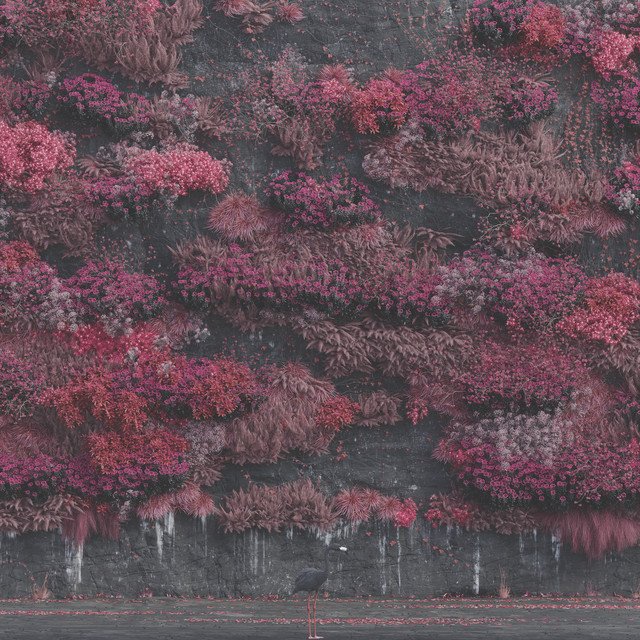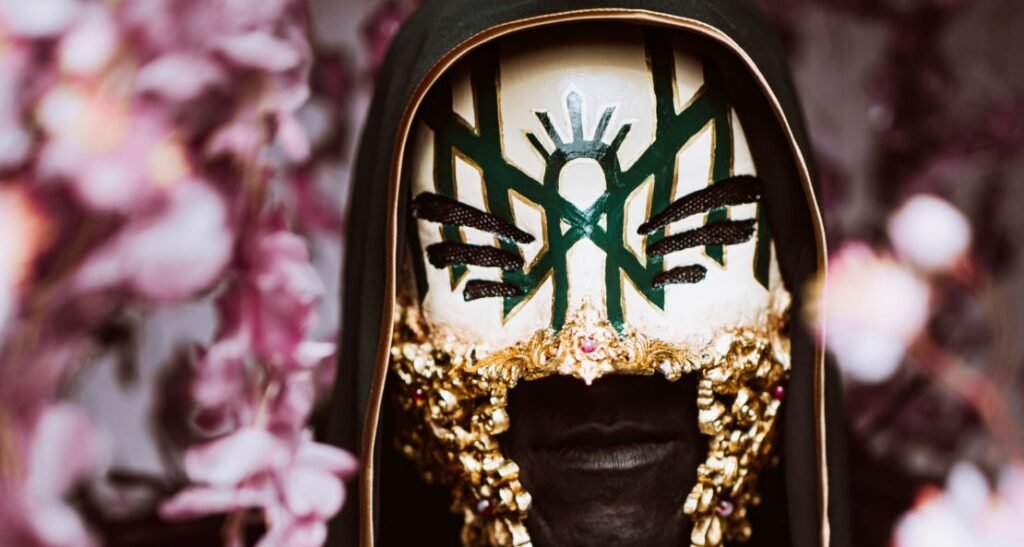Updated: 3 September 2025
Sleep Token arrives at their commercial peak and most polarising moment.
Even In Arcadia landed on 9 May 2025 via RCA, then did what few heavy-leaning records manage anymore: it debuted No. 1 in the US and the UK, set the largest streaming week ever for a hard-rock album, and ran the table across niche charts.
Industry tallies cite 127,000 first-week units in the US, with hefty vinyl sales and a serious streaming footprint; in the UK, it also topped specialist lists including Rock & Metal and Progressive.

That ascent doesn’t exist in a vacuum. The album title gestures toward the old Latin motto Et in Arcadia ego, paradise shadowed by mortality, which fits a project obsessed with beauty under pressure.
The roll-out fed the myth: ciphers and coordinates, a “two-houses” fan split, and even a local US weatherman teasing drops on-air. It was elaborate, a little mischievous, and effective.
The anonymous collective’s fourth album pulls listeners into a world where black-metal eruptions, R&B smoothness, ethereal keys, and hip-hop beats circle around themes of identity, fame, and emotional fracture.
Across ten songs and ~56 minutes, Vessel and co. trade in extremes: candle-lit piano and vapor-thin falsetto set against downtuned chugs, trap-leaning syncopation, and choirs that bloom like theatre lights.
The album kicks off with “Look To Windward,” a track that unfurls slowly, like a painting demanding time to absorb its detail.
What starts with pixel-like, almost chiptune sounds soon swells into a massive, layered storm, with Vessel’s voice shifting from restrained whispers to near-agonised screams. This isn’t background music, it’s an experience designed to haunt.
Lead singles Emergence and Damocles continue the band’s tradition of balancing melody and ferocity, but what surprises is the breadth of new textures.
“Emergence” is the suite. It starts with soft piano and hushed vocal, flirts with skittering electronics and djent-leaning heft, then swerves into a late jazz coda where a real saxophone blows the frame wide.
Gabi Rose is credited on the outro. Multiple outlets clocked that left turn; even classical and pop commentators admired the pivot.
“Past Self” floats on an R&B pulse and glassy pads; “Dangerous” is the mood-swing, introverted, then suddenly loud, with the vocal fighting through stacked guitars and sub.
Vessel’s raw admissions questioning who he once was and whether the masks still fit land with even greater force against the sleek, groove-heavy backdrop.
The title track, Even In Arcadia, sharpens the emotional stakes.
There’s a line early on, “Turns out the gods we thought were dying were just sharpening their blades,” that cuts straight to the heart of the album’s mythic mood.
Across these ten tracks, the band builds a soundscape where the sacred and the broken coexist, each feeding off the other.
“Caramel” is the sugar-slow bruise, where the melody holds the spotlight and the production clears space rather than piling on.
Its already a standout on the charts, deserves every bit of its buzz.
It’s here Vessel confronts fame most directly, describing the stage as both a pedestal and a prison.
The song’s shifts from reggaeton-tinged beats to black-metal fury make it feel like a restless, shapeshifting beast, unwilling to settle into any one skin.
Not every risk lands perfectly. Some listeners have noted that stripped-down moments, like the airy Past Self, wobble compared to the band’s usual high-drama, multi-layered assaults. But the ambition on display outweighs any slight missteps.
Near the end, “Gethsemane” aims for catharsis without cheap fireworks, a six-minute masterpiece that opens with simple, Beatles-esque keys and ends with a proggy, genre-defying climax.
By the time Infinite Baths closes the record, you’re left feeling like you’ve crossed a threshold, not just through an album, but through a full emotional and sonic pilgrimage.
Carl Bown helms the desk; Nolly Getgood adds extra low-end discipline; Jim Pinder and Sebastian Sendon handle detail; Ste Kerry masters for breadth over sheer loudness; the sax cameo arrives on track two.
That team’s choices, especially the way reverbs hang and choirs sit, keep heaviness from blunting the record’s quieter grief.
If Take Me Back to Eden watched a cult become a crush, Even In Arcadia feels like fame fatigue written in real time: the public mask is heavier, the private voice closer to the mic.
Lines about the stage feeling like a cage, trusting the wrong attention, or “coming out from underneath who you were”run through the singles.
That arc syncs with the album’s classical nod, Arcadia as a pastoral ideal always haunted by a reminder that death, doubt, and endings live there too.
In our analysis, the same craft moves kept emerging: the vinyl-crackle prologue, bell-like keys bathed in long reverb, Vessel’s close mic opening like a confession, then the sudden pull to full-band weight.
We also flagged the internal rhymes and stacked harmonies that make the “quiet” sections feel engineered, not merely sparse; the mix prioritises air, not just impact.
Those notes dovetail with the album’s theme of anxiety and spiritual searching rendered beautiful without turning maudlin.
NME’s five-star review framed the record as a risk that pays off, praising its lyrical candour and the way it detonates expectation.
AllMusic called it a streamlined evolution with “Caramel” singled out as the standout.
Clash heard an “absorbing listen” that pushes into underused genre space.
In the US mainstream, Billboard highlighted how the band translated theatre and lore into actual consumption at scale, not just hype.
Pitchfork gave it 2.3/10, arguing the arrangements feel sanded down and “safe,” the djent heft and pop-rap flirtations sitting awkwardly together.
The Atlantic zoomed out, filing Sleep Token under a broader takeover of commercial goth-metal aesthetics, less a diss than a warning about marketability dulling fangs.
The Guardian’s album-of-the-year arguments piece clocked the whiplash between fervent fandom and critical eye-rolls.
On Reddit, you’ll find full-on devotion and hard nos, often inside the same thread.
Praise clusters around “Look to Windward,” “Gethsemane,” “Damocles,” and the title track; detractors call parts of the middle run “vibe over substance,” complain about a recurring “soft intro → heavy bridge” formula, or bounce off the trap and dub textures.
A separate camp swears “Past Self” is secretly top-tier. In other words, it’s doing numbers and starting arguments.
The lore is no longer a sideshow. The whole Arcadia campaign – binary flashes, house allegiances, QR hunts- was fan-base fuel.
The “weatherman clue-drops” became a mainstream talking point, and by the time the record hit, the band were headlining major festivals with a stage show scaled to the new reality.
That they could then sell a piano ballad into the upper reaches of rock charts and slip a saxophone solo into a metal-adjacent single says plenty about the 2025 landscape.
We’ve been watching this shift in real time. When “Damocles” arrived, we wrote about the career-pressure angle and the way Vessel sounds cornered but composed.
“Caramel” showed the project’s soft power: intimacy, open vowels, restraint as tension.
Live-set bayonet “Look to Windward” reads like a thesis for Arcadia’s push-pull, and “Infinite Baths” closes the loop with a quiet that doesn’t feel like peace so much as acceptance.
Those readings still hold across the album proper.
Even In Arcadia is built from contrasts: sanctuary and spectacle, confession and choreography, grooves that nod to pop and drops that still punch like metal.
If you want jagged chaos, you may hear polish where others hear precision.
If you’re allergic to genre splicing, the trap-and-dub inflections will grate.
But if you’re here for scale, and for a singer who can whisper, croon, and, when needed, rip – the record earns its size.
Even In Arcadia doesn’t sound like a band coasting on past triumphs.
It sounds like a group still hunting, still hungry, still asking dangerous questions of themselves and their listeners.
For long-time fans, it’s a deepening of the mythology. For newcomers, it’s an unmissable invitation: step inside, but be ready to come out changed.
You might also like:
- Evanescence’s Afterlife: The Meaning Behind the Lyrics, Sound, and Symbolism
- Navigating Nightfall: A Deep Dive into the Layers of “Routines in the Night” by Twenty One Pilots
- Linkin Park’s Up From The Bottom Lyrics and Meaning: A Defiant Roar From the Wreckage
- Stromae & Pomme “Ma Meilleure Ennemie” Lyrics: A Tale of Duality and Depth
- Drake’s Nokia Lyrics & Video: Club Flexes and an IMAX Wink


